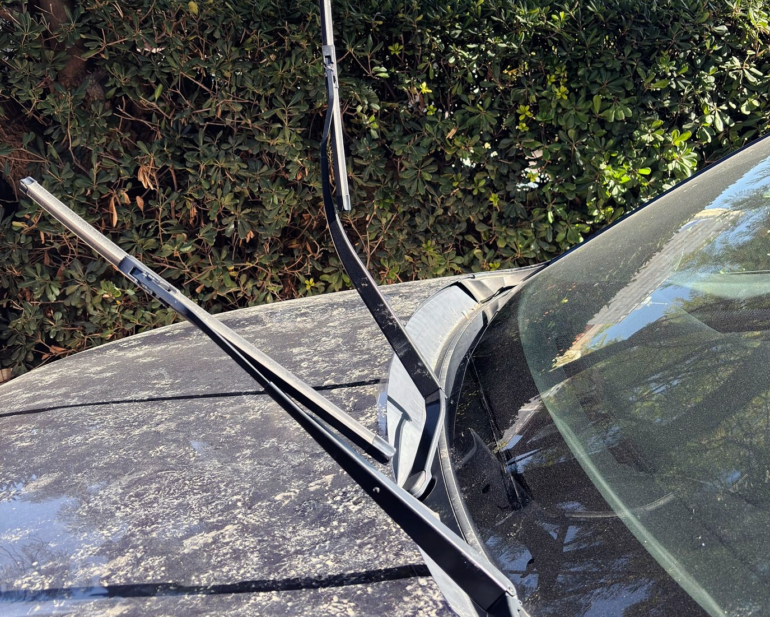In Israel, pulling up the windshield wipers on a car signals displeasure. It’s a warning to the car owner that they’ve done something wrong—taking someone’s parking spot, blocking someone, parking in a no-parking zone, or just having a car that bothers others, like one with a loud exhaust. In short, it’s a visible way of saying, “You’ve crossed a line.”
Such is the case with missionaries in Israel: they are trying to take our spot.
Every day in Jerusalem:
“After Shabbat, they have Motzei Shabbat, with another ritual, Havdala—more candle lighting and more wine,” a female tour guide explained to two young couples on St. James street in the Old City as I was walking by on a recent Shabbat afternoon.
“Judaism has so many rituals that it’s not attractive to most people. We are trying to spread the Jesus religion, and it has to attract people who don’t want all these requirements, demands, and rituals that Judaism imposes.”
These were missionaries in training, and she was their guide.
Growing Missionary Activity
Recently, a Hebrew-language newsletter from Ohr L’Ahim, a counter-missionary organization, warned of increased missionary activity around the Jaffa Gate area of the Old City. The targets often include young Israelis, even minors. Despite the criminality of targeting minors for proselytization, the police closed a complaint file, citing “lack of public interest.” The same newsletter referenced a 16-year-old religious Zionist girl who had been converted to belief in Jesus.
Even in residential areas, the problem persists. Walking through an apartment complex near my home in Arnona, my wife and I overheard a group of four girls, no older than 10, speaking in Hebrew. One said to another, “So, tell me about Jesus.”
Education and Historical Awareness
What do these incidents tell us? They reveal shortcomings in how we educate our children about other religions and their relevance to Jewish history. Our failure to address these gaps leaves a void that missionaries eagerly exploit.
Critics of anti-missionary efforts rightly argue that the fault lies with us. Israel’s education system—divided along religious and ethnic lines—does not adequately prepare students to understand their Jewish identity or the historical relationship between Judaism and other religions. While Jew-hatred in Islam is widely recognized, missionary efforts—a “soft” form of antisemitism—fly under the radar for most Israelis.
Do our children learn about the Crusades, blood libels, the Inquisition, forced conversions, and the role of Christianity in Jewish persecution throughout history? These lessons are essential for understanding modern missionary activity. Of course, education must be balanced and contextual, but ignorance about our own history leaves Israelis vulnerable to manipulation.
What Is Soft Jew-Hatred?
“Soft Jew-hatred” describes missionary antisemitism. It’s subtle, cloaked in kindness, and disguised as love and concern for our well-being. But its goal remains the same as the old
antisemitism: to remove Jews from their ancient religion and practices. Israelis lack a natural defense mechanism against this insidious form of antisemitism. As a nation we often feel isolated and unloved on the world stage, and missionaries know how to exploit this vulnerability. They embed themselves within Israeli society, aligning with respected leaders and organizations to appear normative and trustworthy. They are, metaphorically, parking their car in our spot.
Vulnerable Targets
Missionaries don’t aim for confident, secure Israelis. Their focus is on the vulnerable in society:
the lone soldier, the secular Israeli seeking community and meaning, the outcast Haredi, the recovering addict, the young and impressionable, the non-halachic Russian immigrant, and others who are socially or spiritually vulnerable. They even prey on the sick and dying, visiting hospital rooms to offer “salvation” at moments of weakness.
One of my patients, a religious woman with terminal cancer, was approached in her Jerusalem hospital room by messianic missionaries who presented themselves as kind and sympathetic. Their message? “Jesus was a Jew. He’s the Messiah. He can save you, too.” Thankfully, she sent them away, directing them to Gehinnom (Jewish purgatory).
Seductive Tactics
Missionary organizations estimate they have converted 30,000 Israelis to belief in Jesus. They achieve this through deceptive and manipulative tactics, such as:
– Removing overt Christian symbols (e.g., crosses, imagery of Jesus on the cross)
– Using Hebrew names and Jewish terminology, like calling Jesus “Yeshua”
– Creating hybrid symbols like a cross combined with a Star of David
– Dressing in traditional Jewish attire
– Aligning with respected community and political leaders
– Relabeling Christianity as “Messianic Judaism”
– Financing Jewish community needs and charities
To some, it appears that, sadly, we can be “bought.”
Solutions: Pulling the Windshield Wipers Up
To combat missionary encroachment, we need to take visible and concrete steps:
1. Education: Incorporate comprehensive lessons about world religions, Jewish history, and the impact of missionary efforts into the Israeli curriculum.
2. Community Engagement: Make normative Judaism more approachable and inclusive, providing spiritual, social, and cultural opportunities that address people’s needs.
3. Policy and Awareness: Establish national policies and public campaigns to distinguish between constructive Christian support for Israel and predatory missionary efforts.
4. Social Intolerance: Foster community-level resistance to manipulative missionary practices, making it clear that such behavior is unwelcome.
By metaphorically “pulling up the windshield wipers,” we can signal our displeasure and assert that our spiritual and cultural space is not for others to occupy. Constructive Christian support for Israel and missionary efforts to convert Jews do not have to go hand in hand. It’s time to make that distinction clear.





